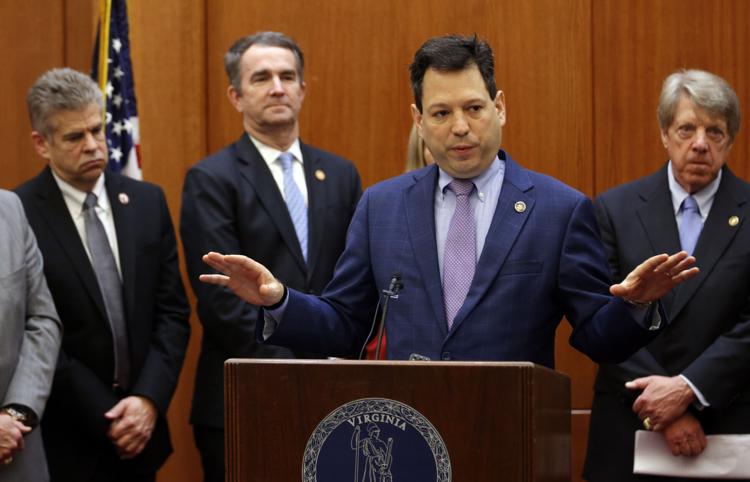Virginia Senate Democrats will not consider police union accountability during special session

State Sen. Scott Surovell, D-Mount Vernon (front)
(The Center Square) – Virginia Senate Democrats discussed several policing reforms they intend to pass during the upcoming special session during a news conference Monday with the Virginia Progressive Prosecutors for Justice, but one issue is absent from the agenda: restricting the power of police unions.
The General Assembly passed legislation to lift its statewide ban on public sector collective bargaining, which Gov. Ralph Northam signed into law earlier this year. Under the new law, local governments can permit collective bargaining for public sector unions, which would give the unions sole authority to represent workers in a given working unit in contract negotiations.
Virginia’s law establishes binding arbitration as the means to settle contract disputes, which means police departments cannot override a decision by an arbiter. This could affect salaries, department policies and even disciplinary measures.
In other states with collective bargaining, such as New York, some policies have shielded police from accountability, including cool-off periods, in which police cannot be asked any questions about a shooting until time has passed, and statutes of limitations being enacted for protocol violations. Virginia’s law goes further, however: an arbiter could prevent an officer from being fired for breaking protocol, even in extreme circumstances.
The new law went into effect in May, and no locality has passed an ordinance to permit collective bargaining.
During Monday’s news conference, state Sen. Scott Surovell, D-Mount Vernon, told The Center Square that Senate Democrats are not considering any new laws to restrict police unions’ ability to collectively bargain on any issues, including disciplinary issues. He said it is “not part of the plan.” The Senate plan includes ending no-knock raids, giving judges and prosecutors more discretion, requiring de-escalation tactics and other reforms.
Del. Robert Bell, R-Charlottesville, told The Center Square after the news conference Republicans are open to some policing reforms that would help good officers get the help and training they need and hold bad officers accountable for their actions. This includes limiting the power of police unions’ ability to collectively bargain.
“That is something we would certainly support,” Bell said.
Without collective bargaining, Bell said Virginia police are able to terminate officers immediately if they violate protocol, rather than needing to go through a lengthy process based on union rules. He said Republicans oppose public sector collective bargaining altogether, but he hopes the state can at least remove disciplinary policies and actions from the collective bargaining rights.
Chris Braunlich, the president of the free-market Thomas Jefferson Institute for Public Policy, said policies established through collective bargaining agreements kept Derek Chauvin, the Minneapolis police officer who knelt on George Floyd’s next until he died in May, on the police force despite having 18 prior complaints on his record, two of which resulted in letters of reprimand.
“The reason George Floyd is dead is because the Minneapolis collective bargaining agreement negotiated by the police union protected a bad cop and put him on the street,” Braunlich said. “A failure to address this issue in Virginia now means it can happen here starting next year. I hope the Senate Democrats change their minds because they owe it to Black Virginians who are most at risk.”
The House Committee for Courts of Justice and the House Committee on Public Safety will hold a joint meeting Wednesday to consider police reform policies.
The legislative special session will convene Aug. 18.

